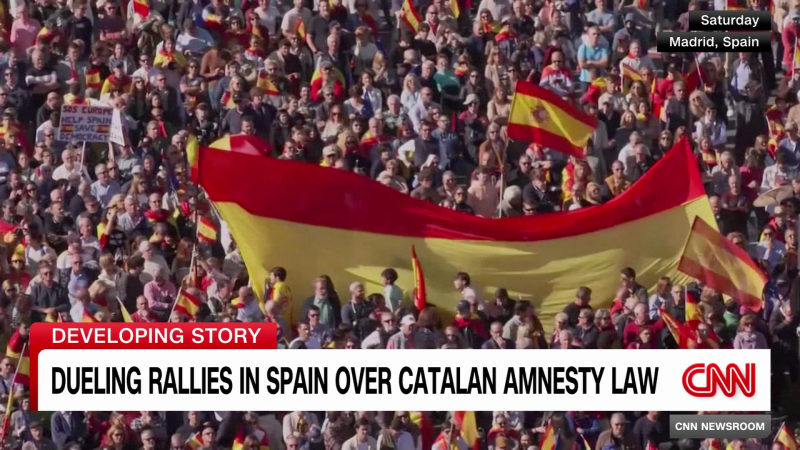
Catalonia Elections: Spain’s Socialists Celebrate Victory as Separatist Influence Wanes

Spain’s Socialists emerged victorious in the recent Catalonia elections, marking a significant shift away from separatist rule in the region. The results signal a turning point after years of independence aspirations among certain factions in Catalonia.
Spain’s Socialists emerged victorious in the Catalan elections held on Sunday, capturing the largest share of the vote. This outcome dealt a significant blow to the separatist government that has ruled the region for over a decade, and to the aspirations for independence still held by some residents of Catalonia.
With over 99% of the votes counted, the Socialists, led by Salvador Illa, secured 42 out of the 135 seats in the chamber. Following closely behind was the hardline separatist party Junts, which obtained 35 seats. The more moderate separatist party Esquerra Republicana de Catalunya (ERC), the incumbent, trailed with 20 seats.
Spain's largest opposition party, the conservative People's Party, had a successful night with a significant increase in seats from three to 15 since the last vote in 2021. Turnout for the vote was low at 58%.
The outcome appears to pose a serious challenge to separatist leadership in Catalonia. The region had sparked a crisis in 2017 with an illegal independence referendum and declaration, but the movement has since weakened in energy and unity.
It also shows Spain's Socialist Prime Minister Pedro Sanchez's efforts to improve relations with Catalonia, which includes granting pardons to those convicted during the independence movement and proposing amnesty for others still facing charges.
Socialist candidate Salvador Illa makes a toast with members of his team and party colleagues after the announcement of the results of the elections.
Socialist candidate Salvador Illa makes a toast with members of his team and party colleagues after the announcement of the results of the elections.
Emilio Morenatti/AP
After the voting count ended, Illa expressed excitement for a "new era" in the region. However, since no party has a clear majority and there are deep ideological differences between them, there is a possibility that the vote may need to be done again.
The separatist parties, made up of ERC, Junts, far-left CUP, and far-right Alianca Catalana, do not have enough seats (68) to form a coalition government.
Illa’s Socialists will need to form an agreement, probably with the ERC, but separatist parties in Catalonia have so far refused to support the national ruling party.
exp Spain Demos 111912ASEG2 cnni world_00002001.png
exp Spain Demos 111912ASEG2 cnni world_00002001.png
video
Related video
Saturday protests in Spain over amnesty for Catalan separatists
Illa could try to create an unusual partnership with Sumar, the far-left party it's in a coalition with at the national level. They might also consider working with the People's Party and Vox, even though the socialists have previously refused to negotiate with them.
During a press conference on Sunday evening, Pere Aragones, the leader of ERC and Catalonia's current president, announced that his party will become part of the opposition, indicating they won't support the Socialists.
Junts’ leader Carles Puigdemont acknowledged that his party had a good performance, but expressed concern over the low turnout among separatist voters. Without strong support from the ERC, AC, and CUP, he faced limited options.
Prior to the election, Puigdemont had mentioned the possibility of withdrawing support from the minority national government if the Socialists formed an alliance with the PP to govern the region. This move, offered after inconclusive national elections in July, could lead to fresh instability at a national level.
According to political analyst and historian Joan Esculies, the main highlight of the night was the decrease in Catalan separatist feelings. He mentioned that "The pro-independence movement is struggling to come up with new ways to persuade or rally people like they used to."
Editor's P/S:
The outcome of the Catalan elections represents a significant shift in the political landscape of the region. The victory of the Socialists and the decline of separatist parties indicate a waning support for independence. This outcome is a setback for the separatist movement that has long dominated Catalan politics. It also poses a challenge to the current national government led by Prime Minister Pedro Sanchez, who has sought to improve relations with Catalonia.
The low turnout in the election suggests that many Catalans are disengaged from the political process. This disengagement may be a reflection of the fatigue and disillusionment that has set in after years of political turmoil and uncertainty. It also raises questions about the legitimacy of the election results and the ability of the new government to represent the will of the people.








